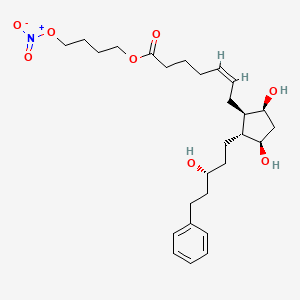
Valeant Pharmaceuticals International, Inc.'s announced that the U.S. Food and Drug Administration (FDA) has approved the New Drug Application (NDA) for Vyzulta (latanoprostene bunod ophthalmic solution, 0.024%). Vyzulta, the first prostaglandin analog with one of its metabolites being nitric oxide (NO), is indicated for the reduction of intraocular pressure (IOP) in patients with open-angle glaucoma or ocular hypertension.1
"With today's approval of Vyzulta, our customers and their patients with glaucoma now have a new treatment option that can help provide consistent and sustained IOP lowering, the only modifiable risk factor that can help slow down the progression of the disease," said Joseph C. Papa, chairman and CEO, Valeant. "We expect to make this new advancement available for those who suffer with glaucoma before the end of the year."
Following topical administration, Vyzulta, a once daily monotherapy with a dual mechanism of action, works by metabolizing into two moieties, latanoprost acid, which primarily works within the uveoscleral pathway to increase aqueous humor outflow, and butanediol mononitrate, which releases NO to increase outflow through the trabecular meshwork and Schlemm's canal. The most common ocular adverse events include conjunctival hyperemia, eye irritation, eye pain and instillation site pain. Increased pigmentation of the iris and periorbital tissue and growth of eyelashes can occur. In glaucoma patients, damage to the trabecular meshwork, through which the majority of the aqueous humor passes, can lead to reduced drainage and as a result elevated IOP. Lowering IOP, even in patients with normal baseline levels, can delay, or even prevent damage to optic nerves, helping to reduce the risk of glaucomatous visual field loss.
"Vyzulta represents the first FDA-approved therapy developed through our proprietary NO-donating research platform," said Michele Garufi, chairman and CEO of Nicox. "We look forward to continuing to leverage our platform in the development of additional innovative ophthalmic compounds."
Preclinical studies have shown that NO plays a role in controlling IOP in normal eyes by increasing aqueous humor outflow through the trabecular meshwork and Schlemm's canal. Studies have also demonstrated that patients with glaucoma have reduced levels of NO signaling in their eyes, providing a rationale for the therapeutic value of NO-releasing molecules for patients with open-angle glaucoma or ocular hypertension.
"The safety and efficacy of Vyzulta has been well-established through multiple clinical studies, which have demonstrated positive results, including statistically significant differences in IOP lowering compared to timolol and latanoprost," said Robert N. Weinreb, M.D., chairman and distinguished professor of Ophthalmology and director, Hamilton Glaucoma Center at the University of California San Diego. "As one molecule with a dual mechanism of action, Vyzulta provides a new treatment option that works to reduce IOP by increasing the outflow through both the trabecular meshwork and the uveoscleral pathways."
Vyzulta was licensed on a global basis to Bausch + Lomb from Nicox. As a result of this approval, Nicox will receive $17.5 million from Bausch + Lomb and will make a $15 million payment to Pfizer under a previous license agreement.
